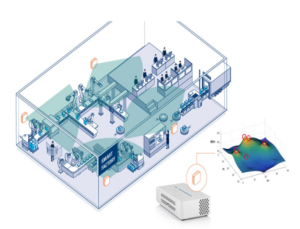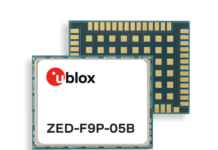
Industrial Radio Lab (IRL) Dresden and Rohde & Schwarz cooperate to research wireless technologies for industry 4.0
Rohde & Schwarz provides high performance network scanners to IRL Dresden to explore reliable and resilient wireless technologies for industrial applications. The test equipment is used for distributed real-time radio spectrum and interference monitoring.
In order to realize industry 4.0 use cases such as mobile robots or automated guided vehicles, industrial network deployments must guarantee very high availability, reliability, and in many cases low latency communications. 5G NR technology including its latest enhancements specified in 3GPP Release 16 enables ultra-reliable low latency communications (URLLC), ideal for private campus network deployments. However, as with any wireless system, the communication link is subject to potential interference on the deployed spectrum bands.
The Industrial Radio Lab (IRL) Dresden is dedicated to researching and testing radio systems for industrial applications. In this effort, they cooperate with Rohde & Schwarz, a leading provider of 5G NR test solutions, which includes portable and easy to use test equipment for assessing a network’s performance in the field. Rohde & Schwarz has provided its high-performance network scanners to the IRL Dresden for distributed real-time radio spectrum and interference monitoring. With this application, the researchers gather important data on how to detect, locate and prevent interference and to keep a local spectrum band clear for reliable wireless connectivity.
IRL Dresden is one of the four regional labs of the Industrial Radio Lab Germany (IRLG) that engages in research and development of current and future wireless technologies in industry. The IRLG creates innovations, supports companies, and collaborates with stakeholders in economy and politics to ensure knowledge transfer towards a digital society. IRL Dresden has a particular focus on detection, localization, and mitigation of interference and improving network resilience through real-time measurements of time-variant channels and cooperative spectrum sensing.
Dr. Norman Franchi, project lead at IRL Dresden, says: “The capabilities to cope with predictable as well as unpredictable disturbances and to provide appropriate self-optimization and self-healing mechanisms are still insufficient. Automated and reliable methods based on real-time measurements and AI analysis to detect, localize and avoid unintentional self-interference as well as intentional interference like jamming are becoming increasingly important and challenging. This is especially true in dynamic industrial use cases and communications scenarios. The goal of the cooperation is to analyze and evaluate the requirements on the measurement sensors and network, and to derive which real-time performance can be achieved.”
Anne Stephan, Vice President Mobile Network Testing at Rohde & Schwarz, says: “Industrial campus network deployments, whether based on private spectrum or provided through network slices from a public operator, generally establish a demanding use case scenario. By partnering with a leading research institute like the IRL Dresden we not only support fundamental research, but gain first-hand insights that we can use to adapt our leading mobile network testing solutions for Industry 4.0”


















